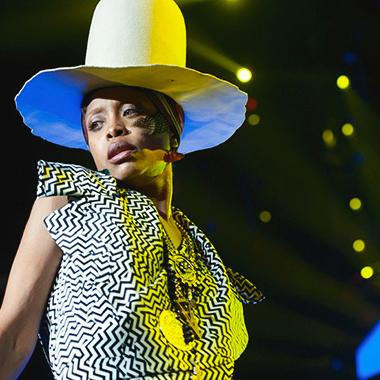

Mama's Gun was met with generally positive reviews from critics. It also features guests such as soul singer Betty Wright and trumpeter Roy Hargrove. The album features substantial contributions from several members of the Soulquarians outfit, of which Badu was a member. The song " Didn't Cha Know?" was also nominated for Best R&B Song. The album contains the single " Bag Lady", Badu's first top 10 Billboard hit, which was also nominated for the Grammy Award for Best Female R&B Vocal Performance and for Best R&B Song. Critics have also noted that while Badu's first album Baduizm contained its share of cryptic lyricism, Mama's Gun is much more direct in its approach, and places the artist in a subjective position more than its predecessor. The album has been viewed by critics as a female companion to neo soul artist D'Angelo's second album Voodoo (2000), which features a similar musical style and direction. It has confessional lyrics by Badu, which cover themes of insecurity, personal relationships, and social issues. A neo soul album, Mama's Gun incorporates elements of funk, soul, and jazz styles. It was recorded between 19 at Electric Lady Studios in New York and released on November 21, 2000, by Motown Records. Its cutting-edge hip-hop sound – delivered here in the shape of an ethereal flute sample offset by sharp, clipped minimalist beats by producer Karriem Riggins – formed the backbone for the singer’s hard-hitting meditations on racial inequality and black oppression.Mama's Gun is the second studio album by American singer Erykah Badu. New Amerykah Part One (4th World War) found Badu taking a huge stylistic and thematic detour from her previous efforts. The track ends with a delicious nod to rare-groove man Johnny Hammond’s “Can’t We Smile.” 14: Soldier 15: Time’s A Wastin’Ī highlight from her second album, Mama’s Gun, “Time’s A Wastin’” fuses funky bass lines with lush strings and playful keyboard interjections to underscore Badu’s cautionary tale to a young black man. Released in 2003 as a supposed EP that was actually longer than most artists’ full-length albums, Worldwide Underground’s immaculately executed analog grooves were exemplified by the deep basslines, dreamy keyboard runs and exquisitely funky guitars of this single – a nostalgic ode to youthful days spent smoking weed with friends.


 0 kommentar(er)
0 kommentar(er)
